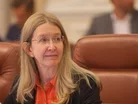Ulana Suprun, Ukraine’s longest-serving Minister of Health

Ulana Suprun served as Ukraine’s longest-serving Minister of Health from 2016 to 2019 and is now a public health advocate and freedom fighter.
Born to a Ukrainian family in Detroit, Michigan, USA, in 1963, Ulana Suprun’s (maiden name Jurkiw) grandparents had been involved in underground movements against the Nazis and the Soviets throughout the Second World War. They sought refuge in the USA, but always hoped to return to Ukraine one day. The Jurkiw family became core members of Detroit’s Ukrainian community and Ulana later met her husband Marko in a Ukrainian youth event. They married in 1991, the year the Union of Soviet Socialist Republics was officially dissolved and the Berlin Wall came tumbling down.
“My MSU mentors helped me develop empathy for my patients, which was beneficial when seeking solutions as Minister of Health” Ulana Suprun
Healthcare mentorship developed empathy
As a child, Ulana visited Ukraine with her family and saw how the country had changed under Soviet rule.
“Ukraine had been crushed by Russia and, during the visit, we were followed,” she recalled. “We weren’t allowed to visit the villages my parents were from and our family couldn’t visit us at the hotel. There was no freedom at all.”
The visit left a firm imprint on Ulana and she was determined to return, but her education came first.
Ulana attended Michigan State University College of Human Medicine, graduating in 1989.
“The college not only gave me the knowledge I needed to become a physician, I also received the social and cultural pieces that formulated who I am,” Suprun said. “My mentors at MSU helped me develop empathy for my patients, which was especially beneficial later when seeking solutions as Minister of Health.”
After working as a radiologist at Sinai Hospital of Detroit, Suprun moved to New York City where she supported women who felt that they were not being listened to.
7m internally displaced Ukrainian’s need healthcare
Transforming Ukraine’s health system
After Russia invaded – and subsequently annexed – Crimea in 2014, Ulana and Marko wanted to help the Ukrainian military.
She and Marko moved across the world to obtain Ukrainian citizenship in 2015. Together, they founded Patriot Defence, which trained soldiers in combat lifesaver courses and distributed 21,000 first aid kits, catching national attention.
Prime Minister Volodymyr Groysman asked Ulana to serve as Minister of Health in 2016 and she immediately got to work, updating the legal status of health care facilities, mobilising universal health coverage through the National Health Service of Ukraine, and allowing Ukrainians to choose their physicians and health care facilities.
February 2022 and Patriot Defence
In modern warfare, the wide availability of cameras has led to unforgettable photographs of war crimes being instantaneously documented and shared globally.
For Russia’s invasion of Ukraine, the defining photo is of a pregnant woman being evacuated on a stretcher from a maternity ward in Mariupol. Sadly, neither mother nor baby survived Russia’s attack against the hospital.
The post-WW2 1949 Geneva Convention states that: ‘Civilian hospitals may in no circumstances be the object of attack but shall at all times be respected and protected by the Parties to the conflict’. The World Health Organisation recorded Russia’s 100th attack on a Ukrainian healthcare facility in April.
At the time of writing, there are more than 7 million internally displaced Ukrainians who, in times of war and peace, need healthcare. Ulana is ready with Patriot Defence, an organisation she founded to train soldiers in first aid. There is a lot of healthcare improvement to be done in Ukraine, according to Ulana.
"None of the hospitals are prepared for mass casualties," said Suprun. "The larger, second-line military hospitals in Dnipropetrovsk and Kharkiv boast that only 1% of the soldiers they care for pass away, but that's because the critically wounded guys die before they can ever get to those hospitals."
- McKesson: Advancing Sustainable Healthcare & Supply ChainsSustainability
- How is UnitedHealth Using AI & Sustainability in Healthcare?Health Insurance & Finance
- How J&J is Tackling The World’s Toughest Health ChallengesMedical Devices & Pharma
- Top 10: Chief Compliance Officers in HealthcareHealth Insurance & Finance




